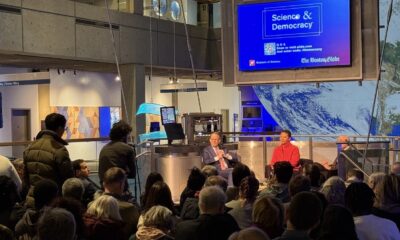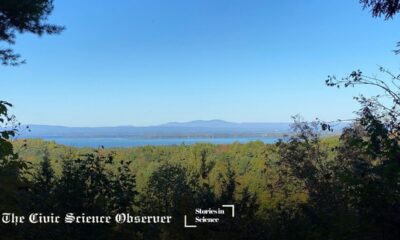Stories in Science Special Series
Babies and Biochemistry: My Path to Finding Balance

– Cara Florance –
[dropcap]I[/dropcap]’m the daughter of a physicist and chemist. My parents exposed me to many types of science from an early age and I loved it. I always wanted a career in science and I successfully sought education and occupations that I have been truly passionate about. During college, I interned with NASA to study the volatile organic composition of comets, studied atmospheric carbon monoxide concentrations on Mars using data collected on telescopes in Hawaii, and worked part-time at a radiation decontamination firm. I decided to get my PhD in biochemistry, spending years developing various types of catalytic RNA. Two days after I defended my work, I found out I would be embarking on a different life changing experiment – I was pregnant.
Not too surprisingly, I was the first to have a child among my young professional friends; in contrast, I was the last of our friends from my husband’s army career. I always enjoyed being in the middle of these seemingly disparate worlds. It‘s easy to become insulated when your career also dictates your community, as in academia or the military. Luckily, I felt our association with truly good and kind people on both sides moderated my perception of the balance between motherhood and career.
In the Army, many mothers stay home with the kids to give their families stability during intermittent deployments of their spouses. However, in science, staying at home is often seen as a waste of your degree or failing to invest in your own future. These latter ‘negatives’ are also often felt by Army wives (and really any parents!) that stay home, but for women in science this may feel especially difficult due to the pervasive stigma and pressure of seeking equality in the field. At the time, I knew exactly what I was going to do.

Cara Florance
At my new job, a biotech startup where I was the first employee, I always thought I would continue working after my daughter was born. I not only loved my work, but I felt it was important to model the personality traits I value to my daughter, like kicking ass at your job. My coworkers and bosses were incredibly supportive.
They offered to take over preparation of the potentially mutagenic solutions I needed while I was pregnant, they cleaned out a private room in the back where I could pump breastmilk, and they even babysat my daughter after daycare ended while I finished experiments for the night when my husband wasn’t available. It was difficult, but doable, especially with the support of my spouse and coworkers. I really couldn’t have asked for more.
My breaking point arrived slowly. Days would pass where I didn’t get to see my daughter awake and not nursing. I began to realize the child care was not meeting our standards and I felt angry that we were paying so much for subpar care. My husband got his deployment schedule and I worried about the thought of doing it all alone. I gave my bosses six weeks notice because I felt so guilty leaving the company and I wanted to be sure they had time to hire someone that I could train.
After leaving, I felt like an outsider to research and was told on several occasions that my career would fail for choosing my family. For a while, I focused on other interests. I learned how to trade options on the S&P, wrote and self-published a few children’s books about biochemistry, and began studying to become a health physics consultant. As I began to feel more confident as a mother (and side hustler!), I began to feel more confident in my decision to stay home for a few years.
You have a lot of time with your thoughts when you’re the main food source for a human for several months. I began thinking about stages of life and wishing I had asked other mothers in science what they had done during their children’s early years. I had no idea whether they stayed home or continued to work, and I wish I had sought more mentorship.
Then I realized something; these few years I’m at home, though unspeakably significant for my personal life, should be insignificant to my professional life. I know many scoff at the idea of re-entering the professional workforce after having children. I’m excited to take on that challenge! There will always be compelling scientific questions to answer, and I will always have the persistent, creative, analytical mind that earned me my degrees and career before children, and I hope a future employer is willing to see that.
In my training as a scientist, I encountered no outward examples of this path for a woman (or man for that matter) with a PhD, but I’m sure they exist. I encourage parents who chose some time off to be heard, to speak of their successes and troubles, and to change the stigma of this path in science. If you are just beginning to navigate parenthood and a career, just remind yourself that it’s your life.
Do what’s best for you and your children, whether it be staying at home or staying at work, and be unapologetic about it. This is one of the most personal decisions you can make, weighing finances, passions, goals, and indescribable love. There is no right answer, but I hope now and in the future there will be more opportunities to parents who chose to take time off, and more support to parents who chose to stay.
Cover image by Darwin Laganzon | CC0 Creative Commons
The CS Media Lab is a Boston-anchored civic science news collective with local, national and global coverage on TV, digital print, and radio through CivicSciTV, CivicSciTimes, and CivicSciRadio. Programs include Questions of the Day, Changemakers, QuickTake, Consider This Next, Stories in Science, Sai Resident Collective and more.

-
Audio Studio1 month ago
“Reading it opened up a whole new world.” Kim Steele on building her company ‘Documentaries Don’t Work’
-
 Civic Science Observer1 week ago
Civic Science Observer1 week ago‘Science policy’ Google searches spiked in 2025. What does that mean?
-
Civic Science Observer1 month ago
Our developing civic science photojournalism experiment: Photos from 2025
-
Civic Science Observer1 month ago
Together again: Day 1 of the 2025 ASTC conference in black and white
Contact
Menu
Designed with WordPress
























